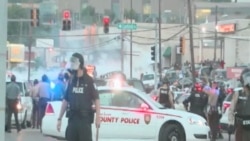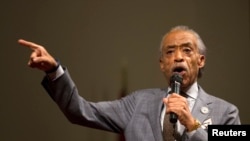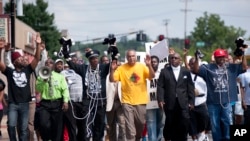President Barack Obama called the police shooting death of an unarmed black teenager a tragedy on Tuesday and urged a thoughtful response after two nights of violent protests, looting and arrests in a St. Louis suburb.
But early on Wednesday, a police officer shot and critically wounded a man who drew a handgun near the site of the protests, he St. Louis Post-Dispatch newspaper reported, citing a police spokesman.
St. Louis County Police Department officers responded about an hour after midnight to reports of four or five men with shotguns and wearing ski masks. They encountered “multiple subjects running,” police spokesman Brian Schellman said.
One of them pulled a gun on an officer, who fired at him, police said. The man was taken to an area hospital.
Shortly after midnight, police fired tear gas into protesters who had confronted a line of officers after a far larger crowd dispersed, Schellman said. A photograph in the St. Louis Post-Dispatch showed a protester wearing a shirt with an American flag printed on it throwing a tear gas container back at the police.
Watch related video of VOA's Chris Simkins
President Obama promised a full investigation by the U.S. Department of Justice into the teenager's death, which has provoked outrage in the largely African-American town of Ferguson.
“I know the events of the past few days have prompted strong passions, but ... I urge everyone in Ferguson, Missouri, and across the country, to remember this young man through reflection and understanding,” Obama said in a statement.
Friends and family of Michael Brown, 18, held a peaceful church vigil on Tuesday night, after his father pleaded for an end to the violence. Standing with supporters, including the Rev. Al Sharpton, Michael Brown Sr. said he wanted justice for his son but wanted it “the right way.”
“I need all of us to come together and do this right, the right way,” said Brown Sr., who wore a T-shirt showing his son's baby picture. “No violence.”
Several hundred protesters appeared to heed the calls for non-violence late on Tuesday evening, chanting “hands up, don't shoot” and “no justice, no peace” during a tense but ultimately peaceful stand-off with police clad in riot gear and flanked by armored vehicles near the site of Brown's death.
The protesters, some of whom waved signs as the group was led in chants by megaphone, had dwindled to a handful before midnight.
Also on Wednesday, a woman was shot in the head in a drive-by shooting blocks from the area where Brown was killed. Her condition and whether the shooting were related to the protests was unknown, Schellman said.
In a separate incident simmering in California, a vigil was planned after Monday's shooting death of an unarmed 24-year-old black man in Los Angeles, USA TODAY cited a Los Angeles Police Department spokeswoman as saying.
Sharpton, a New York-based civil rights leader, called for peaceful protest in the wake of looting and more than 50 arrests since the shooting. Sharpton's National Action Network will pay for Brown's funeral.
“To become violent in Michael Brown's name is to betray the gentle giant that he was,” Sharpton said of the 6-foot, 4-inch (198-cm) Brown, who had planned to start college this week.
Missouri Governor Jay Nixon told a packed church in North St. Louis County on Tuesday evening the community was “reeling from what feels like an old wound that has been torn open afresh.”
The activists also were demanding authorities make public the name of the officer involved. The police had said they would release the officer's name on Tuesday, but changed the plan, citing fears of retaliation, according to media reports.
Police said Brown was shot in a struggle with a gun in a police car but have not said why Brown was in the car. At least one shot was fired during the struggle and then the officer fired more shots before leaving the car, police said.
The FBI has opened a civil rights investigation into the racially charged case and St. Louis County also is investigating.
Conflicting accounts
A witness to the shooting interviewed on local media has said that Brown had been putting his hands up to surrender when he was killed.
“There were many, many witnesses who have talked to family members and they paint a very different picture than police witnesses,” said Benjamin Crump, an attorney for the Brown family. Crump also represented the family of Trayvon Martin, an unarmed black teen killed in Florida by a neighborhood watch volunteer in 2012.
The “hands up” gesture has been frequently seen at protests over the shooting. More than 100 protesters in front of the St. Louis County Courthouse in nearby Clayton on Tuesday morning chanted “hands up, don't shoot.”
Demonstrations on Sunday night turned violent, with looting and property damage. Violence broke out again on Monday night as police officers in riot gear, armed with rifles and accompanied by dogs tried to secure the area.
Residents in the low-income, mostly black neighborhood where Brown was killed say they are often harassed by police. Ferguson Police Chief Tom Jackson said the neighborhood had a lot of crime but there were no race problems.
Ferguson has seen a stark demographic shift in recent decades, going from all white to mostly black. About two-thirds of the town's 21,000-strong population are black. On a police force of 53, three officers are black.
The race of officers should not matter as long as their work is fair and professional, said Dave Klinger, a former police officer and criminal justice professor at the University of Missouri-St. Louis.
“If the officer behaved inappropriately, we've got to sanction the officer and figure out what it is that led him to do what he did,” Klinger said. “Was he poorly trained? Was there a pattern in this agency?”
Klinger said the investigation must be as “transparent as possible.”









